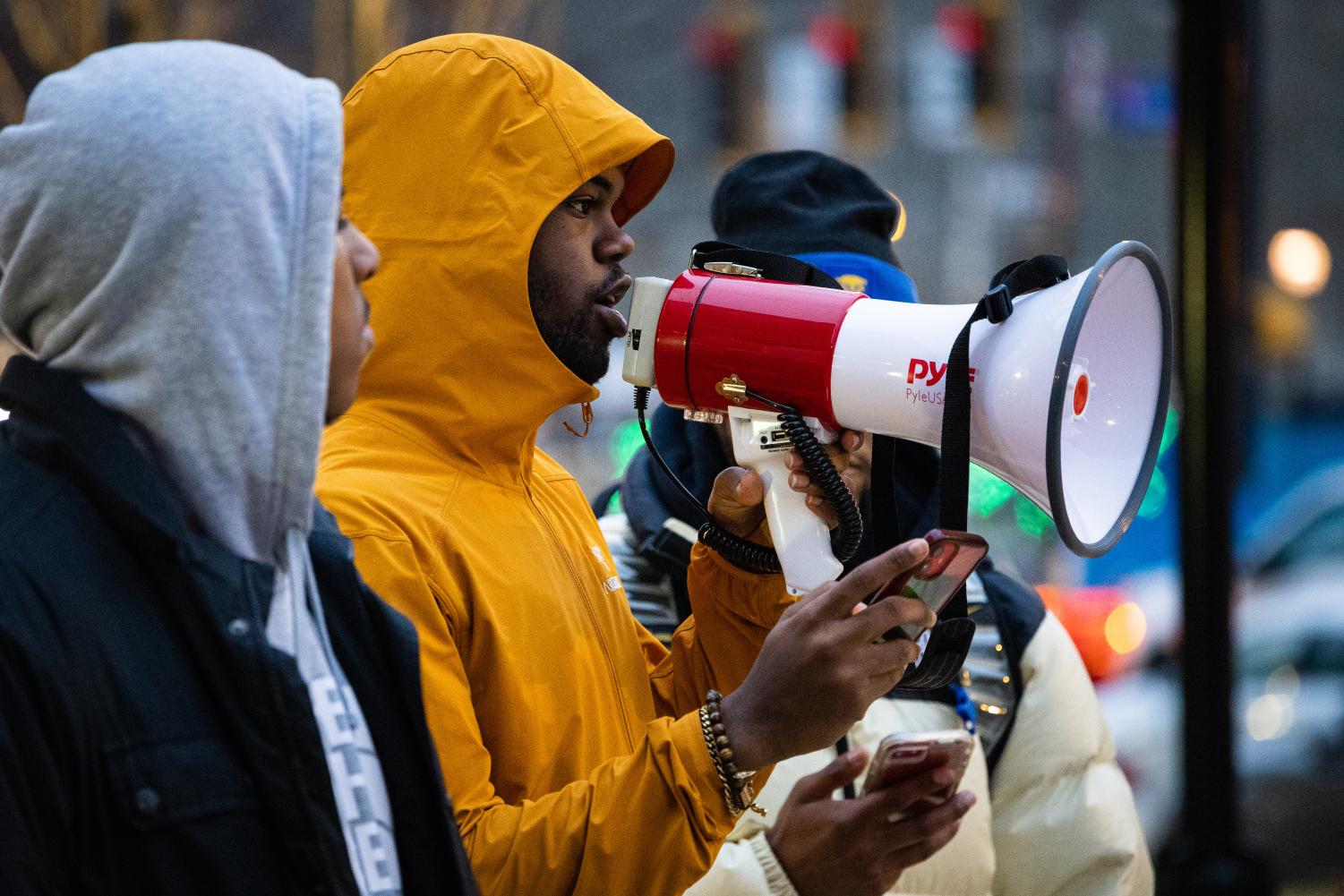‘We are not satisfied’: Pitt students protest police brutality, demand justice for Tyre Nichols


Protesters speak into a microphone during the Tyre Nichols protest on Sunday.
Following the release of the graphic video showing Tyre Nichols’ death at the hands of Memphis police on Friday, Pitt students protested police brutality on Sunday night using a somewhat unconventional method — police sirens.
Santana Dominguez, one of the protest organizers and a junior neuroscience major, said he decided to play a police siren to send a message that police shouldn’t use sirens to intimidate Black people.
“For generations that sound has been closely tied to police violence and oppression against our people, and I wanted to signal to them and the world that we will no longer allow them to intimidate us via their violence or intimidation tactics,” Dominguez said. “We as a people have to have the courage to confront the system and be able to move past the fear of them and their system, and I was letting them know that [police] have to be a part of the change as well.”
About 50 people gathered at the intersection of Forbes and Oakland Avenues Sunday evening to mourn the death of Nichols and demand police accountability. Protestors gave speeches, marched down Forbes and took a knee for three minutes to symbolize how long police officers beat Nichols.
Nichols, a 29-year-old Black man, was beaten by five Memphis police officers after being pulled over on January 7 for alleged reckless driving. Nichols died three days later from injuries. The five officers from the Memphis Police Department, who are also Black, were fired and face criminal charges.
The Black Action Society also released a statement on Sunday in response to Nichols’ death. They said his death is an example of systematic racism and “marks yet another betrayal by the broken United States policing system.”
“The Black Action Society recognizes that police-community member violence against Black people is not solely about race,” they said. “This is a product of poor policing from within a broken policing system.”
Dominguez expressed his frustration and outrage over Nichols’ death and said he was
dissatisfied with the repeated occurrences of police brutality against Black people.
“We are here today because another Black brother, son, friend, student, scholar, has been slain,” Dominguez said. “We are here today not only rallying in support of Tyre Nichols’ family but in protest because we are not satisfied. We are not satisfied with the police system, we are not satisfied with the daily mistreatment of our people and we are not satisfied with the justice system.”
Dominguez also acknowledged the difficulties people may experience watching the bodycam footage of Nichols’ death, saying a video is not necessary to understand the devastating effects of police brutality.
“You don’t have to watch the video of Tyre Nichols being beaten by police,” Dominguez said. “You don’t have to subject yourself to that trauma. It should not require another video of a Black human being dehumanized for anyone to understand that police brutality and racism is an urgent, devastating issue.”
Dominguez added that while all of the police officers who beat Nichols are Black, it “does not diminish the claim that the system is racist.”
Brycen Worsham, a protest organizer and a sophomore business major at Carnegie Mellon University, said Nichols’ story could have happened to any Black man, including himself.
“Tyre Nichols could’ve been me,” Worsham said. “He could’ve been any one of my brothers as well.”
“My question is, when will this stop? When will the police not look at any of us and immediately assume we are criminals,” Worsham continued. “We are students, doctors, businessmen and lawyers. Our protest today is for Tyre Nicols, Trayvon Martin, Michael Brown, Eric Garner and all those who have been affected by police brutality.”
Organizers asked people in attendance if they wished to speak about their feelings on police brutality and Nichols. Susie Joseph, a junior communications major, spoke up facing the police officers standing nearby and said she is tired of being afraid.
“I am sick and tired of it,” Joseph said. “Too many of us have gone down for no reason and we should not have to fear your [police] badge.”
“We are people before we are Black. We are people before we are minorities,” Joseph added. “We cannot be the only ones standing up for ourselves.”
Chinyere Okonkwo, a junior political science major, said she has grown up watching the effects of police brutality and is exhausted having to constantly demand change.
“I’m tired of crying, walking, pleading and begging for change, and I’m only 20,” Okonkwo said.
Recent Posts
Therese Pitman: Giving back to Pitt’s student-athletes with equality
Pitman is Pitt’s Director of Student Athlete Development where she helps student-athletes navigate their career…
Pitt speech and debate team heads to nationals
The William Pitt Debating Union, Pitt’s speech and debate team, sends students to both in-person…
Visuals: A Year in Review
The visuals desk had an interesting year. In the midst of the 2024 Presidential Election,…
De-stress events across campus offer students a break from studying
During finals week, departments across campus are offering wellness events to help students manage stress…
Pitt students share their summer plans
After a long and strenuous academic year, many students are excited to take a break.…
Column | Collaboration and connection make us better — yes, even in journalism
Today is the last day I will ever do this, and despite the amount of…

